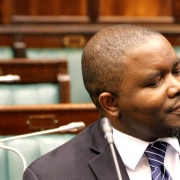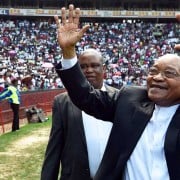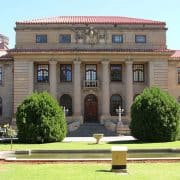|
Getting your Trinity Audio player ready...
|
by Steven Friedman
First published in Business Day
For not the first time, many of us seem to need reminding that the Constitutional Court’s job is to make sure politicians stick to the rules — not to do their jobs for them.
Last week’s Constitutional Court judgment deserves the cheers that greeted it — it sent the clearest message yet that the Constitution is working. It is not automatic for courts anywhere to hold presidents to account. So, when they do this and their decisions are implemented, we are in better shape than we thought, even if many South Africans cannot use courts to protect themselves. But cheer does not last long in the suburbs here and so, it seems set to dissolve into another round of despair because the president is still in office.
To expect the court ruling to end the Jacob Zuma presidency is to misunderstand how constitutional democracy works in every country where it exists. In constitutional democracies, courts do not remove presidents — parliaments do.
There is good reason for this. Courts are not supposed to run democracies, they are meant to make them work. To run the government, you need to be elected by the people, so courts do not decide who should occupy an elected office. That is why the judges, despite strong criticism of the president, said nothing about whether he should stay. They know this is not their role.
Whether a president who has been found to have breached the Constitution should be removed is a political issue and, in all democracies, these issues are decided by the elected representatives of voters. This is why overheated claims that we are in a “constitutional crisis” because Zuma is still in office show a deep ignorance of how the system works.
Political processes that decide whether presidents should go are rarely quick or simple. Presidents are impeached or forced to resign when they lose the confidence of the politicians whose support allows them to govern. This usually means their own party (in the US, Nixon resigned because his party ditched him, Clinton didn’t because his supported him) or, as in Brazil now, a coalition partner that withdraws support. So, it is normal for Zuma’s fate to depend on the politics of his party, the African National Congress (ANC).
That does not mean citizens must sit by idly — they can and should press for what they want. But if they want the president to go, they will get their way only if that president is abandoned by his or her political support. Because this is never quick or easy, presidents in this position never leave quickly or quietly. They try to hang on, limiting the damage as much as they can.
Their parties usually support them. Those wanting them out know they will win only if they step up the pressure, and so a contest begins that is settled by who has more power.
This is what will happen here. Zuma’s fate will be decided by the politics of the ANC: right now, those who want him gone don’t have the votes and so are more interested in replacing him with someone they support than launching a doomed attempt to push him out. That is why the ANC is pretending to unite behind the president. But that will change if political pressure from outside the ANC builds on the president and his supporters.
That the judgment will be followed by this political battle does not mean the Constitution isn’t working. It means democratic politics is at play. The courts have done the only job they can do: the rest depends on politics. This is also true of an aspect of the judgment that is being largely ignored. An independent office, the Public Protector, can now force the president and government to account. That is an important legal lever in the hands of citizens, but it may be threatened later this year.
Because everyone now knows that the Public Protector’s is an important office, who is appointed when Thuli Madonsela leaves towards the end of the year has become much more significant. And so, we can expect a crucial political battle over who should follow her that will be settled both by who has power in the ANC and by the strength of citizens’ groups.
In both cases, those who think courts can make up for winning political strategies are likely to find themselves losing. And they will bring this upon themselves by depending on courts to do what politics must do.
• Friedman is director of the Centre for the Study of Democracy at Rhodes and Johannesburg universities








